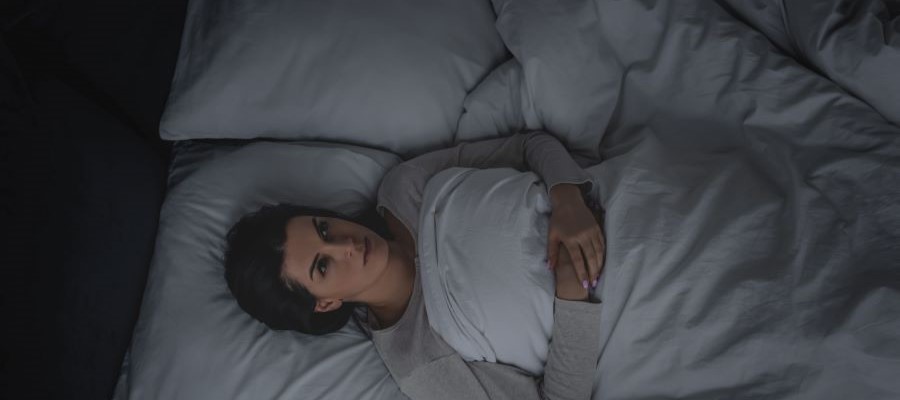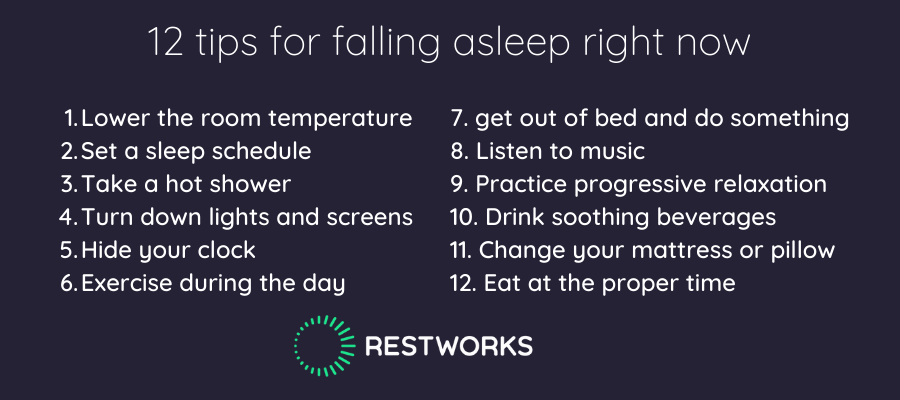12 tips on how to fall asleep right now
We’ve compiled a list of practices that may help you fall asleep faster. Find the one – or the combination – that helps you fall asleep right now!
1. Lower the room temperature
Your body temperature changes when you fall asleep and a room that is too warm can make it harder to sleep. Try setting your thermostat to a cool temperature – between 60-75ºF (15-23ºC) is the best temperature for sleeping.
2. Set a sleep schedule
Going to bed and waking up at the same time every day can help regulate your internal clock, or circadian rhythm. Remember, it has been proven that adults operate the best with seven to nine hours of quality sleep every night.
3. Take a warm bath or shower
Stepping out of a warm shower into cool air causes a quicker drop in your body temperature, which triggers the release of melatonin, a naturally occurring hormone that tells your body it is time to sleep. Therefore, having a shower before bed can help you fall asleep quickly.
4. Turn down lights, power off screens
Light, particularly blue light suppresses melatonin production so reducing bright lights in the hours before bedtime can help your body prepare for sleep. Fluorescent and LED lights are popular for their energy efficiency and bright light, but they put out a lot of blue light. Try switching out the lightbulb in a few lamps to reduce bright light in the evenings. Turn off all screens (TV, tablets, smartphones) at least an hour before bedtime to fall asleep faster.
5. Hide your clock
Whether you have a hard time getting into sleep or wake in the middle of the night and struggle to get back to sleep, looking at your alarm clock repeatedly only adds anxiety around the fact that you aren’t asleep. So, move your alarm clock across the room or better yet, turn it around so you cannot see it.
6. Exercise during the day
Exercise boosts the levels of serotonin and decreases levels of cortisol in the brain. This can lead to longer sleep duration and better sleep quality. For many, it is beneficial to get in a workout in the morning, rather than later in the afternoon.
7. Get out of bed & do something
If you have difficulty sleeping or wake up in the middle of the night and spend more than 15 minutes trying to get back to sleep, get up! It’s better to leave your bed and do something else for a little while than to lay in bed worrying about how to fall asleep right now. Try an activity that requires you to use your brain and your hands, like a puzzle or a coloring book. Just remember, this does not mean you should stay awake and finish that last episode of your Netflix show!
8. Listen to music
Music can help relax and lull you to sleep however, not all music will have this affect. Many people report that classical music or other music with between 60-80 beats per minute improves their sleep quality. However, scientific evidence for certain types of music being more effective than others is not consistent. In the Restworks sleep app you can find specially composed sleep music as well as a nap timer.
9. Practice progressive muscle relaxation technique
Starting with your toes, tense your muscles for five seconds and then relax those muscles for 30 seconds. Move upwards to your calves, thighs, glutes all the way to your head. Alternately, start with your face or neck and work your way down your body, deliberately tensing and relaxing each body part.
10. Drink the right beverage
Caffeine is an easily accessible, popular stimulant that many people reach for to get them through their afternoon slump. However, caffeine can affect your sleep even when consumed hours before bedtime. If you have trouble falling asleep, try eliminating caffeine for at least six hours before bedtime – this includes coffee, sodas, energy drinks and even chocolate. Instead, try a soothing tea such as chamomile or lemon balm to help you relax.
11. How comfortable are you in bed
Consider your comfort level in bed. Is your mattress firm enough or soft enough for you? Is your pillow providing the right support for your neck? Is your blanket and the clothes you wear to sleep soft and do they keep you at the right temperature? You may consider trying a different mattress or pillow or pajamas made from a different fabric to keep you cool and comfortable throughout the night.
12. What and when should you eat
The food we eat has a huge impact on our bodies throughout the day and our sleep may particularly be affected by what we eat before we go to sleep. Research shows that a high-fat, low carb meal will promote more restorative sleep than a high-carb, low fat meal of the same number of calories. If you must indulge in that big bowl of spaghetti for dinner, try to finish your meal at least four hours before you go to bed so that your body has time to digest it.

Chronic insomnia requires medical assistance
While insomnia is a condition that can affect us all from time to time due to circumstances in our lives, chronic insomnia is a serious health hazard that requires treatment. This article is not intended to provide medical advice. If you suffer from chronic insomnia, you should seek medical assistance.


